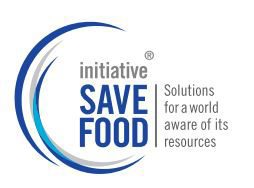Study Highlights Importance of Food Cold Chain in Reducing Food Waste GHG Emissions
Category : Press Release
Paris, France (December 4, 2015) — A study released today by the Global Food Cold Chain Council (GFCCC) highlights the importance of refrigeration technology in reducing greenhouse gas emissions associated with food waste. According to a study by Bio Intelligence Service, a member of the Deloitte network1, expansion of the food cold chain in developing countries could reduce net food waste greenhouse gas emissions by 180-550 million tons of CO2 equivalent annually between now and 2050, representing more than a 50% reduction in the carbon footprint of food waste currently due to the lack and/or inefficiencies of cold chains2. GFCCC Executive Director Kevin Fay said, “It is important that we remain focused on all aspects of potential for greenhouse gas emissions reduction, especially those associated with food waste. Technology offers substantial savings today and in the future as new innovations evolve.”
In 2013, the United Nations Food & Agriculture Organization (FAO) concluded that if food waste were a country3, it would be the third highest emitter of greenhouse gases in the world, second only to China and United States. The GFCCC was organized under another initiative of the United Nations, the Climate and Clean Air Coalition (CCAC), to address the potential for reducing the contribution of hydrofluorocarbons (HFCs) as a component of HFC climate policy. GFCCC Executive Director Fay emphasizes that there are significant opportunities for reducing greenhouse gas emissions from this sector by expanding the cold chain, particularly in developing countries, improving the energy efficiency of the equipment being utilized, and transitioning the equipment from relying on high-global warming potential HFCs, to low- global warming potential (GWP) compounds and technologies, including HFO’s, carbon dioxide, hydrocarbons and ammonia. The Deloitte study was tasked with identifying net benefits and impacts that took in to account energy consumption and HFC emissions as a result of cold chain expansion.
The GFCCC was organized to address the usage of HFCs, and its member companies remain committed to this effort, but has also examined the benefit of additional savings in the sector. The Council is supporting a proposed amendment to the Montreal Protocol treaty to facilitate the transition away from high-GWP HFC technology. In addition, it is encouraging policymakers to improve capacity building for developing countries to understand the benefits of cold chain expansion in reducing food waste and thereby significantly enhancing the environmental benefits. The food cold chain consumes about 20% of global HFC usage currently, and energy consumption by the technology is an important factor in its overall GHG contribution. “Effective policy approaches that capture the food waste reduction, improve energy efficiency, and transition away from high-GWP HFCs provide an overwhelmingly cost-effective GHG reduction initiative,” said Fay, “that also helps reduce hunger and improve more effective utilization of precious water supplies.”
1 “Deloitte” refers to one or several firms that are members of Deloitte Touche Tohmatsu Limited (“DTTL”), a UK company limited by guarantee and its network of member firms organized in legally separate and independent entities. To know more about the legal structure of DTTL and its member firms please visit www.deloitte.com/about. In France, Deloitte SAS is the member firm of DTTL and professional services are rendered by its subsidiaries and affiliates. As such, DTTL does not provide professional services to clients, or direct, manage, control or own any interest in any member firm or any member firm’s affiliated entities. Consequently, neither DTTL nor any of its member firms has any liability for each other’s acts or omissions. Each of the member firms is a separate and independent legal entity operating under the names “Deloitte”, “Deloitte & Touche”, “Deloitte Touche Tohmatsu” or other related names.
2 This is an extract of a complete study that was prepared by BIO Intelligence Service for the Global Food Cold Chain Council (“GFCCC”) with support from United Technologies (“UTC”). This study presents an assessment of the potential of the cold chain sector to reduce GHG emissions through food loss and waste reduction. The study was prepared for GFCCC’s and UTC’s use to meet specific requirements and may not be used by any third party independent of the GFCCC and UTC engagement without permission from BIO Intelligence Service.
3 FAO, 2013. Food Wastage Footprint Impacts on natural resources – Technical Report. Available at: http://www.fao.org/docrep/018/ar429e/ar429e.pdf

